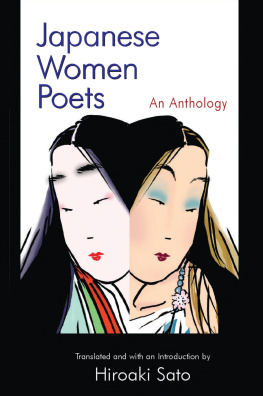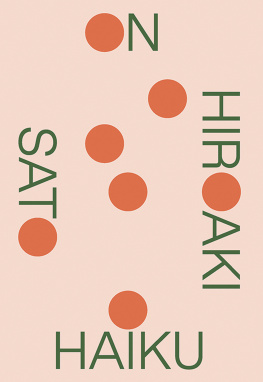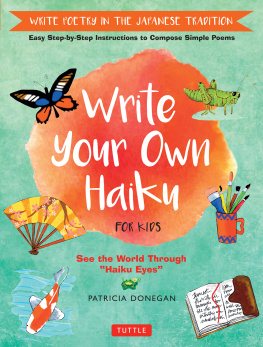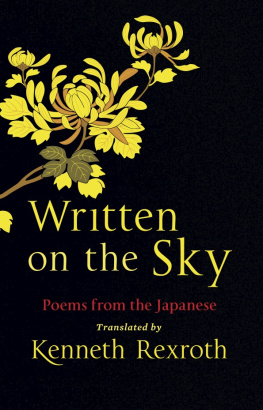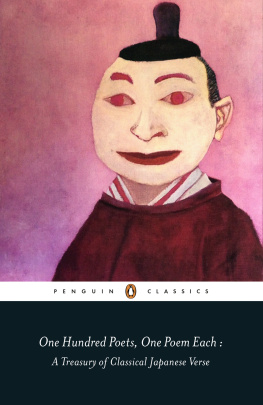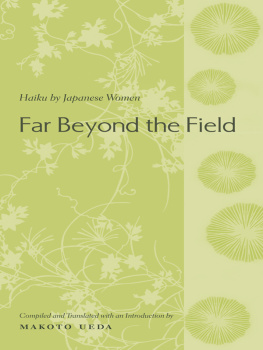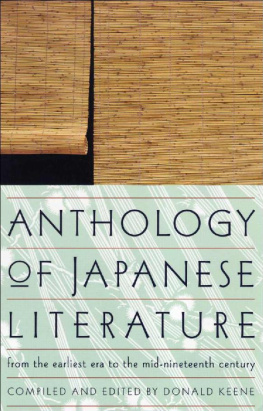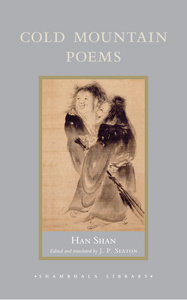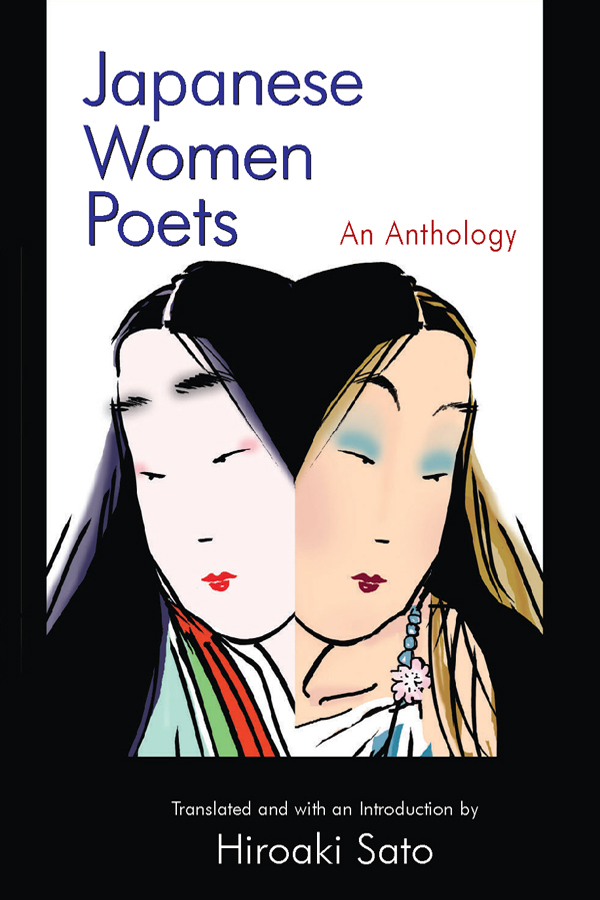
Japanese Women Poets
Japanese Women Poets
An Anthology
Translated and with an Introduction by
Hiroaki Sato
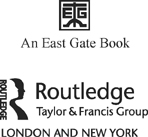

An East Gate Book
First published 2008 by M.E. Sharpe
Published 2015 by Routledge by
2 Park Square, Milton Park, Abingdon, Oxon OX14 4RN
711 Third Avenue, New York, NY 10017, USA
Routledge is an imprint of the Taylor & Francis Group, an informa business
Copyright 2008 Taylor & Francis. All rights reserved.
No part of this book may be reprinted or reproduced or utilised in any form or by any electronic, mechanical, or other means, now known or hereafter invented, including photocopying and recording, or in any information storage or retrieval system, without permission in writing from the publishers.
Notices
No responsibility is assumed by the publisher for any injury and/or damage to persons or property as a matter of products liability, negligence or otherwise, or from any use of operation of any methods, products, instructions or ideas contained in the material herein.
Practitioners and researchers must always rely on their own experience and knowledge in evaluating and using any information, methods, compounds, or experiments described herein. In using such information or methods they should be mindful of their own safety and the safety of others, including parties for whom they have a professional responsibility.
Product or corporate names may be trademarks or registered trademarks, and are used only for identification and explanation without intent to infringe.
Library of Congress Cataloging-in-Publication Data
Japanese women poets: an anthology / translator and editor Hiroaki Sato.
p. cm.(Japan in the modern world)
Includes bibliographical references and index.
ISBN: 978-0-7656-1783-5 (cloth: alk. paper)ISBN: 978-0-7656-1784-2 (pbk: alk. paper)
1. Japanese poetryTranslations into English. 2. Japanese poetryWomen authors
Translations into English. I. Sato, Hiroaki, 1942
PL872.E3J379 2007
895.61089287dc22 | 2006019874 |
ISBN 13: 9780765617842 (pbk)
ISBN 13: 9780765617835 (hbk)
To Nancy
I sent a poem to a man I was in love with as fleetingly as dew:
White dew, dreams, this world, illusions: all these last for eternities in comparison .
Izumi Shikibu
Brief Contents
Note and Acknowledgments
Chronology
Twelve Months
Introduction
Ancient Songs
Songs from the Kojiki
Songs from the Nihon Shoki
Poems from the Manysh
The Age of Tanka
The Age of Haikai and Kanshi
Haikai Poets as Eccentrics
Interludes
A Brief Survey of Senry by Women
A Brief Survey of Haiku by Women
The Modern Age
Japanese Verse Forms and Poetic Terms
Bibliography
Index of Poets
Detailed Contents
Note and Acknowledgments
Chronology
Twelve Months
Introduction
Ancient Songs
Songs from the Kojiki
Songs from the Nihon Shoki
Poems from the Manysh
Introduction
Princess Iwa, Emperor Nintokus Consort
Empress Okamoto (594661)
Princess Nukata (Born 638?)
Empress Naka (7th Century)
Empress Yamato (7th Century)
Anonymous Lady (7th Century)
Empress Jit (648702)
Imperial Princess ku (661701)
Imperial Princess Tajima (Died 708)
tomo no Sakanoue no Iratsume (First Half of the 8th Century)
Kasa no Iratsume (First Half of the 8th Century)
Maidservant (First Half of the 8th Century)
The Wife of Lord Isonokami no Otomaro (First Half of the 8th Century)
The Kurumamochi Clans Daughter (Dates Unknown)
Empress Kken (718770)
A Border Guards Wife (Dates Unknown)
Mother of a Member of an Embassy to the Tang Court (First Half of the 8th Century)
The Age of Tanka
Introduction
Princess Uchiko (806847)
Member of the Korenaga Family (Dates Unknown)
Princess from the tomo Family (Dates Unknown)
Ono no Komachi (fl. 833858)
Ise (875?939?)
Akazome Emon (957?1041?)
Murasaki Shikibu (973?1014?)
Izumi Shikibu (Born Late 970s)
Sagami (991?1061?)
Princess Shikishi (Died 1201)
Kenreimonin Uky no Daibu (Born 1157?)
Kunai-ky (Died 1205?)
The Nun Abutsu (1222?1283)
Eifukumonin (12711342)
Shsh no Naishi (Died 1264?)
Rikei (Died 1611)
The Age of Haikai and Kanshi
Introduction
Haikai Poets as Eccentrics
Den Sute-jo (16331698)
Kawai Chigetsu (163471708?)
Shiba Sonome (16641726)
Ogawa Shf (16691758)
Nozawa Uk-ni (Died 1722?)
Kaga no Chiyo-ni (1703?1775)
Arii Shoky (17141781)
Taniguchi Den-jo (Died 1779)
Tagami Kikusha (17531826)
Ema Saik (17871861)
Kamei Shkin (17981857)
Hara Saihin (17981859)
Takahashi Gyokush (18021868)
Yanagawa Kran (18041879)
Furukawa Kasame (18081830)
Sakuma Tachieko (18141861)
Interludes
A Brief Survey of Senry by Women
A Brief Survey of Haiku by Women
The Modern Age
Introduction
Yosano Akiko (18781942)
Hiratsuka Raich (18861971)
Fukao Sumako (18881974)
Okamoto Kanoko (18891939)
Takeuchi Rie (19011958)
Kaneko Misuzu (19031930)
Hayashi Fumiko (19031951)
Matsuda Tokiko (19052004)
Nagase Kiyoko (19061995)
Fujita Fumie (19081933)
Fujiki Kiyoko (Dates Unknown)
Sat Sachiko (19111998)
Sagawa Chika (19111936)
Ogawa Anna (Born 1919)
Ishigaki Rin (Born 1920)
Iijima Haruko (19212000)
Nakaj Fumiko (19221954)
Nomura Hatsuko (Born 1923)
Itami Kimiko (Born 1925)
Shinkawa Kazue (Born 1929)
Katase Hiroko (19292006)
Tada Chimako (19302003)
ba Minako (Born 1930)
Shiraishi Kazuko (Born 1931)
Takarabe Toriko (Born 1933)
Bessho Makiko (Born 1934)
Koyanagi Reiko (Born 1935)
Tomioka Taeko (Born 1935)
Kimura Nobuko (Born 1936)
Nagashima Minako (Born 1943)
nishi Kimiyo (Born 1947)
Isaka Yko (Born 1949)
Kamakura Sayumi (Born 1953)
Abe Hinako (Born 1953)
Nagami Atsuko (19551985)
Cheon Mihye (Born 1955)
Hirata Toshiko (Born 1955)
It Hiromi (Born 1955)
Park Kyong-Mi (Born 1956)
Mizuhara Shion (Born 1959)
Koike Masayo (Born 1959)
Mayuzumi Madoka (Born 1962)
Tawara Machi (Born 1962)
Hayashi Amari (Born 1963)
Kamiyama Himeyo (Born 1963)
Hachikai Mimi (Born 1974)
Japanese Verse Forms and Poetic Terms
Bibliography
Index of Poets
About the Translator
Note and Acknowledgments
All Japanese names in this anthology are given the Japanese way, family name first. Following Japanese custom, poets are sometimes identified by personal name or penname, sometimes by family name. Unless otherwise noted, all translations are mine. Several Kojiki and Nihon Shoki translations originally appeared in From the Country of Eight Islands: An Anthology of Japanese Poetry (Doubleday, 1981; Columbia University Press, 1986); a passage from Mumysh quoted in the introduction, a passage from the Masu-Kagami in the Kunai-ky section, as well as all the poems of Princess Shikishi, in String of Beads: Complete Poems of Princess Shikishi (University of Hawaii Press, 1993); Record of an Autumn Wind, complete and fully annotated, in Monumenta Nipponica , vol. 55, no. 1 (Spring 2000); all the poems of Ema Saik, in Breeze Through Bamboo: Kanshi of Ema Saik (Columbia University Press, 1997); Yosano Akikos Cochineal Purple (from Midaregami ), May It Not Come to Pass that You Die, The Woman, In Praise of May, and Augustes Single Strike in The University of California Book of Romantic and Post-Romantic Poetry; some of Nagase Kiyokos poems, in Poetry Kanto 2006 ; many of Fujiki Kiyokos haiku, in ant ant ant ant ant (Fall 2003); some of Ishigaki Rins poems, in From the Country of Eight Islands and Poetry Kanto 2006 ; Takarabe Torikos Talk of Horses in Circumference (Fall 2003), several in online magazine Fascicle (Summer 2005), and several in Poetry Kanto 2006 ; all of Shinkawa Kazues poems, in Not a Metaphor: Poems of Shinkawa Kazue (P.S., A Press, 1999); many of Tada Chimakos poems, in Anthology of World Poetry of the 20th Century , Volume II (Green Integer); all of Tomioka Taekos poems, in See You Soon: Poems of Taeko Tomioka (Chicago Review Press, 1979); some of Koyanagi Reikos poems, in Rabbit of the Nether World (Red Moon Press, 1999); all of Kimura Nobukos poems, in The Village Beyond: Poems of Nobuko Kimura (P.S., A Press, 2002); one of her poems, Over There, also in the Asia special issue of Atlanta Review (Spring/Summer 2002); all of Nagashima Minakos poems, in The Girl Who Turned into Tea: Poems of Minako Nagashima (P.S., A Press, 2000); fifteen of Kamakura Sayumis haiku in Modern Haiku (Fall 2000); Abe Hinakos Garden Party and The Future Belongs to Olenka in online magazine Fascicle (Summer 2005) and Nagami Atsukos poem, Descending to Hell Valley in the Nippara Stalactite Cave, in the Tin House magazine (Summer 2003, Vol. 4, No. 4) and some others, in Bomb (Spring 2004); all of Park Kyong-Mi in online magazine The Green Integer Review , No. 2 (MarchApril 2006); Hirata Toshikos Recent Photos and A Womans Life or Nakayama Atsuko and Koike Masayos The Most Sensuous Room in online magazine How2 (2005); most of A Brief Survey of Haiku by Women, in Modern Haiku (Autumn 2002) and most of A Brief Survey of Senry by Women, in Modern Haiku (WinterSpring 2003); Twelve Months in Modern Haiku (WinterSpring 2006); and some of the other modern haiku, in Blythe Spirit and Frogpond .
Next page
